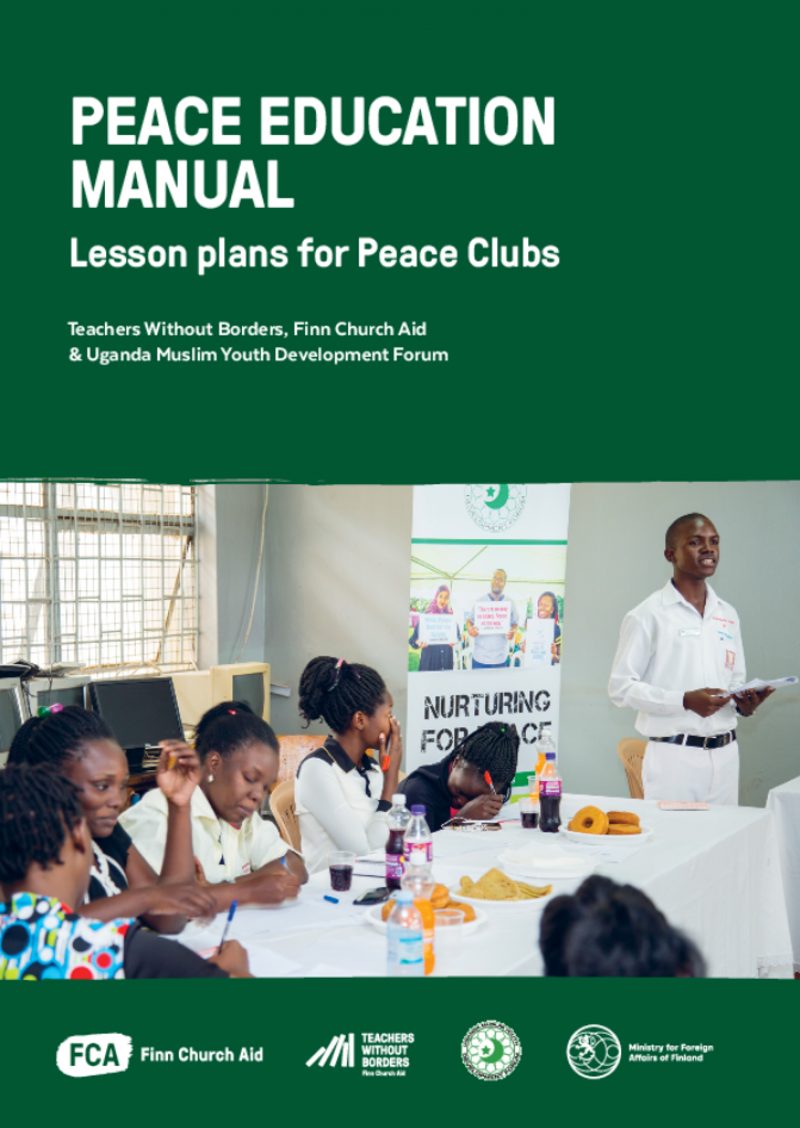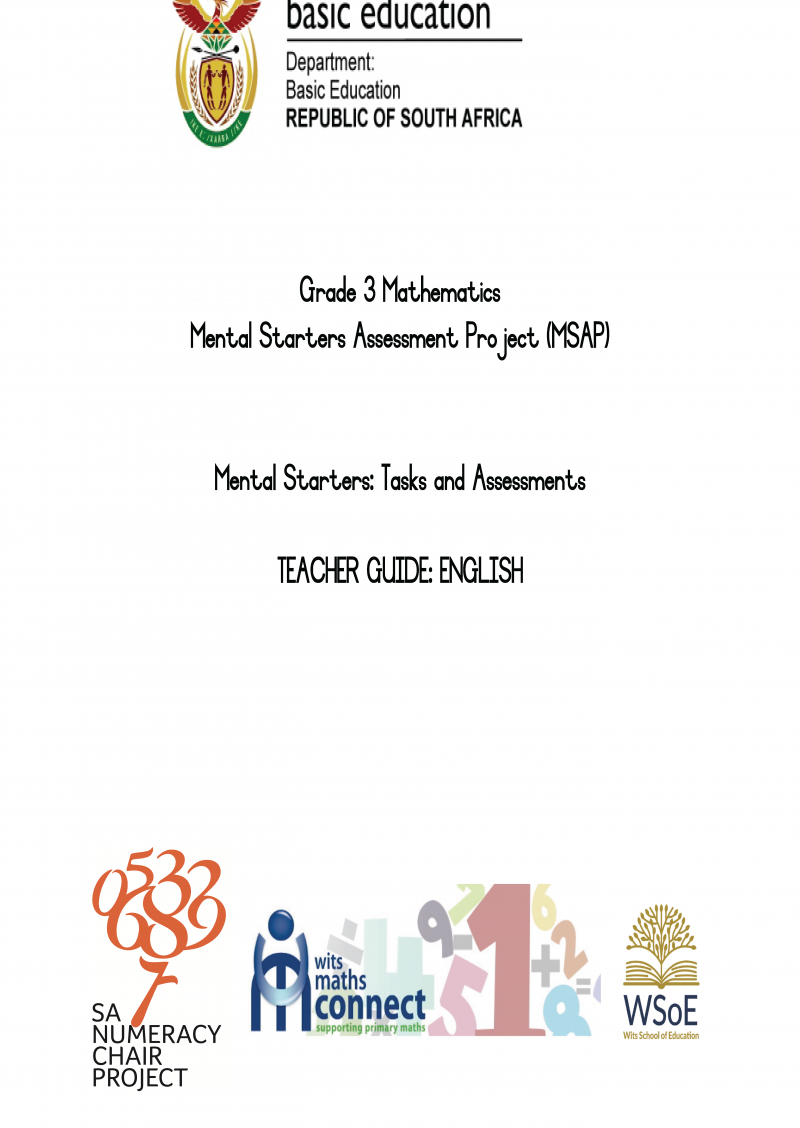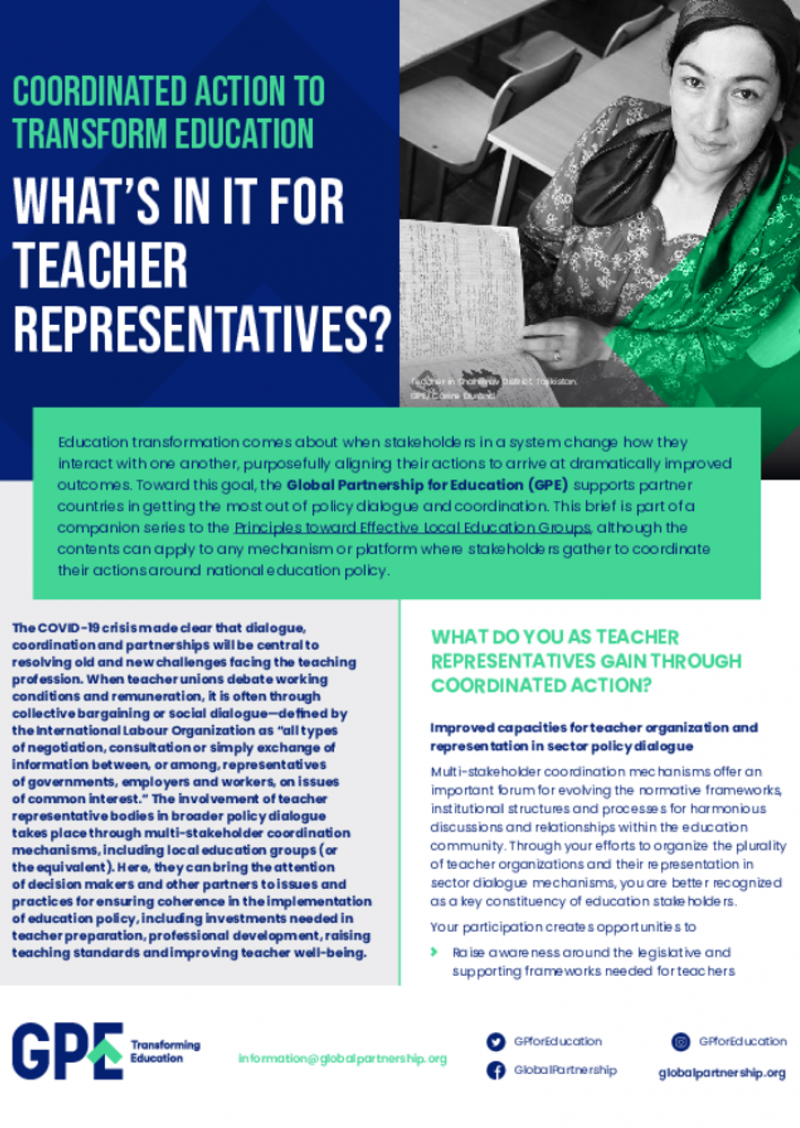Centre de Ressources pour les Enseignants
Bienvenue sur le Centre de ressources pour les enseignants, la plate-forme de connaissances de l’Équipe spéciale sur les enseignants destinée aux enseignants. Le Centre de ressources offre un point d’accès unique à des contenus ayant un lien direct avec les pratiques d’enseignement, tels que des plans de cours, des guides d’élaboration des programmes, des possibilités de formation pour les enseignants et les recherches les plus récentes en matière de pédagogie.
Il vise à soutenir les enseignants, les formateurs d’enseignants, les concepteurs de programmes d'études et les professionnels de l’éducation en général, en leur donnant accès à un recueil de ressources qui les inspireront et les aideront dans l’exercice de leur profession.
Recherche rapide dans les ressources
Ou rechercher dans
Parcourez nos contenus les plus récents
Ressources pédagogiques
Accédez à du contenu pour appuyer votre enseignement, afin de l'utiliser en classe ou pour préparer vos cours.
Peace Education Manual. Lesson plans for Peace Clubs
This Peace Education Manual has been developed in collaboration with Finn Church Aid (FCA) Uganda, local partner Uganda Muslim Youth Development Forum (UMYDF) and Teachers Without Borders (TWB) Network Finland.
The manual was developed to strengthen the pedagogical and methodological quality of local peace clubs during the spring and summer of 2022. The contents of the manual were successfully piloted with more than 480 young people in eight lower secondary school peace clubs established and run by UMYDF with the support of FCA in Uganda. Two of the peace clubs are located in the Bidibidi Refugee Settlement, one of the largest refugee settlements in the world.
The material consists of 34 lessons plans and is primarily aimed for young people. The different sections and activities of the material can be used flexibly in training, clubs, or, for example, as individual lessons on peace building, socio-emotional skills, conflict resolution or cooperation skills. The exercises are functional, learner-centered and emphasize active participation of youth. The material is adaptable for use anywhere in the world.
FCA and UMYDF have been working together since 2016 in Uganda to promote the positive role of youth in conflict prevention and peacebuilding. In our work, peace education is defined as a holistic, multidisciplinary and transformative process that seeks to develop capacities that promote non-violent conflict resolution, respect for human rights and active participation.
FCA & TWB Inclusive Education Manual
This Teacher Training Manual on Inclusive Education supports teachers and other education personnel’s continuous professional development in inclusive, quality education especially in diverse low resource contexts and is adaptable for use anywhere in the world. The Inclusive Education Manual directly contributes to realization of several targets of the Agenda 2030 Sustainable Development Goal (SDG) 4 “ensuring inclusive and equitable quality education for all”.
The manual was developed by Finn Church Aid (FCA) and Teachers Without Borders (TWB) Network Finland. The content has been collected and built on the numerous good materials and practices used and co-developed by FCA staff and TWB education experts in different countries and contexts.
The training manual consists of three (3) training modules that can be used flexibly:
- Education, Teacher and School Community,
- Inclusive Education, and
- Positive Classroom and Learning Environment for All Learners.
The content design allows the trainer or facilitator to pick individual modules or sessions and adapt the training content according to the context and target group’s needs.
We hope you find it useful!
Mathematics lesson starters for Grade 3 learners
A set of teacher guides containing each 6 Mental Mathematics Lesson Starter units for Grade 3 learners, in alignment with the South African curriculum. A different calculation strategy is in focus in each unit. These calculation strategies are taken from the curriculum. Each unit covers a particular group of connected skills, and the aim is to move learners on from counting in ones on their fingers or with tally marks on paper.
Each unit is three weeks long; it begins and ends with a short test for the learners. Marking these tests provides information for the teacher and the learners about how much they have improved in using that particular set of skills during the three weeks. Within each unit, the focus is on three types of calculations: fluency, strategic calculating and strategic thinking.
Working through the Lesson Starters in each unit should lead to improvements in learners’ performance from the pre to post-tests. These improvements show progress in mental mathematics skills and number sense.
The guide is available in 11 official languages of South Africa.
Recherches
Découvrez les dernières recherches en matière de pratiques d’enseignement et de pédagogie.
How to Train 21st Century Teachers
Magdalena Brier, Managing Director at ProFuturo speaks with Mary Burns, ICT and teacher training specialist, about technology, education, teachers and the future. They delve into questions such as what skills a teacher must have to teach with technology, or what are the main obstacles that they encounter when trying to do so.
Watch this video to know more about the future of digital education and to listen to key advices on how to use technology in the classroom provided by Mary Burns who has a 40 years’ experience on teacher training.
Coordinated action to transform education. What's in it for teacher representatives?
This briefs presents what teacher representatives gain through coordinated action. The involvement of teacher representative bodies in broader policy dialogue takes place through multi-stakeholder coordination mechanisms, including local education groups (or the equivalent). Here, they can bring the attention of decision makers and other partners to issues and practices for ensuring coherence in the implementation of education policy, including investments needed in teacher preparation, professional development, raising teaching standards and improving teacher well-being.
Cyberbullying on social media: an analysis of teachers’ unheard voices and coping strategies in Nepal
Teachers can be potential victims of cyberbullying, particularly targeted by their students at their workplaces.
This article explores teachers' individual coping strategies of sharing, ignoring and enhancing self-efficacy to handle technology strongly and confidently, and it concludes with the implications of collaborative coordination necessary for the development of strong policies and strict cyber laws for ensuring teachers’ cybersecurity in similar contexts.
Teachers’ self-efficacy in preventing and intervening in school bullying: a systematic review
This article presents a systematic review of existing literature on the extent of teachers’ self-efficacy in managing bullying and its connection to the likelihood that teachers will intervene in bullying, to their intervention strategies, and the prevention measures they employ, as well as students’ bullying behavior and their experiences of victimization.
The study presents practical implications in relation to teacher initial education and professional development: teachers with higher self-efficacy tend to intervene more often in bullying situations, so it's important that teacher training programs are designed to support teacher's self-efficacy, through the use of appropriate methods, such as the use of role-play to practice specific professional behaviours.
Perfectionnement professionnel
Accédez à des ressources et à des possibilités de formation pour perfectionner vos connaissances et pratiques pédagogiques.
Active Teaching and Learning Manual
The Active Teaching and Learning booklet presents the principles and practices of learner centered pedagogy as a teaching approach to achieve quality education. It is accompanied by cards on methods, techniques and tools, which provide teachers with examples and tips for classroom implementation. The booklet was developed by the Teacher Instructor Education Training department of the Ministry of Education, Science Technology and Sports of Uganda, with support from the Belgian Development Agency, in the framework of the Teacher Training and Education project.
How to use ICT tools in teaching and learning
This booklet presents a selection of ICT tools to integrate into teacher training in Uganda. Every tool is accompanied with creative ideas and suggestions on how to engage learners and enrich lessons.
Technology enhanced learning
This course is an introduction to technology enhanced teaching and learning.
General teaching methods
This course aims to get the best out of the teaching practices from pre-service teachers, in-service teachers and anyone who is eager to contribute to quality education. It has been written by the Teacher Training Education Project, implemented by Enabel and the Ministry of Education and Sports in Uganda.
Possibilités de formation à venir
How to design an electronic lesson in 24 hours
Learning design for smart learning.
Defines the general landscape of instructional design in smart education.
Understand the five steps of lesson planning in Smart Learning.
Explains the requirements for designing a session in smart learning.
Design a smart learning session using Google Classroom.
Social and emotional learning for schools
This is a dual certifying course that combines social and emotional learning (SEL) for classrooms and SEL for teachers. The objective of the certification is to enhance personal well-being and build the professional capacity of teachers for SEL.
How to become a remote teacher in 24 hours
Recognize e-learning technology.
Identify the main components of e-learning.
Identify tools for managing the educational process in e-learning.
Uses the tools of the educational process: Moodle Cloud.
Online Learning Design for Educators Specialization
Specialization offering three courses for educators seeking to improve and expand their repertoire of online teaching skills related to the design, development and delivery of effective and engaging online courses and lessons for school age and adult learners. It includes three courses: "Online education: The foundations of online teaching", "Create video, audio and infographics for online learning", "Online teaching: Using Zoom to connect with learners". It is possible to audit the courses for free.
Autres centres de ressources
Le nombre de partenaires proposant des ressources pour les enseignants à travers le monde est en augmentation mais ne permet pas toujours aisément de s'y retrouver parmi les plateformes existantes. Vous trouverez ici une liste de plates-formes sélectionnées par l'équipe de la TTF, avec une description des types de contenus et des langues disponibles. La liste comprend des plates-formes de membres de la TTF et d'autres pays.




